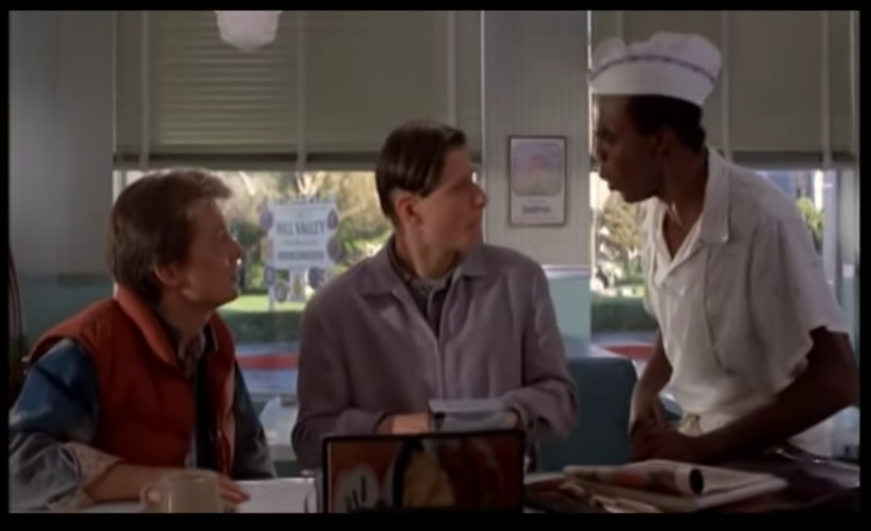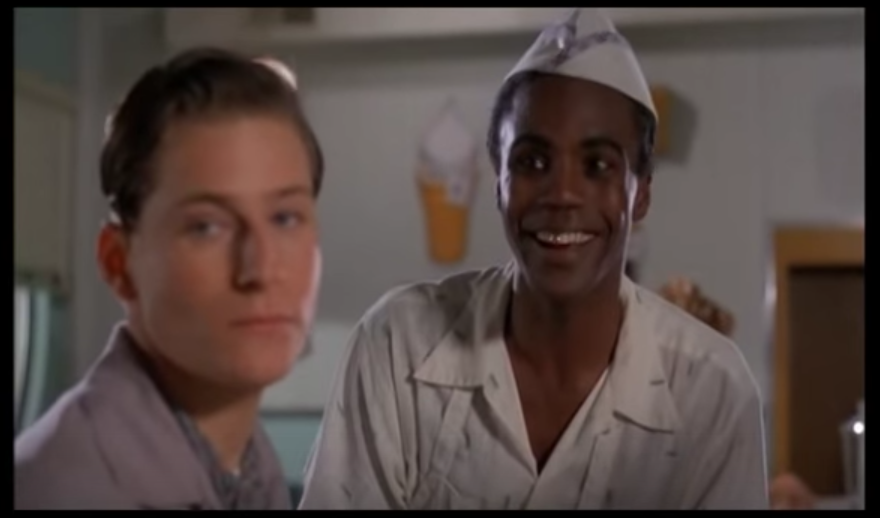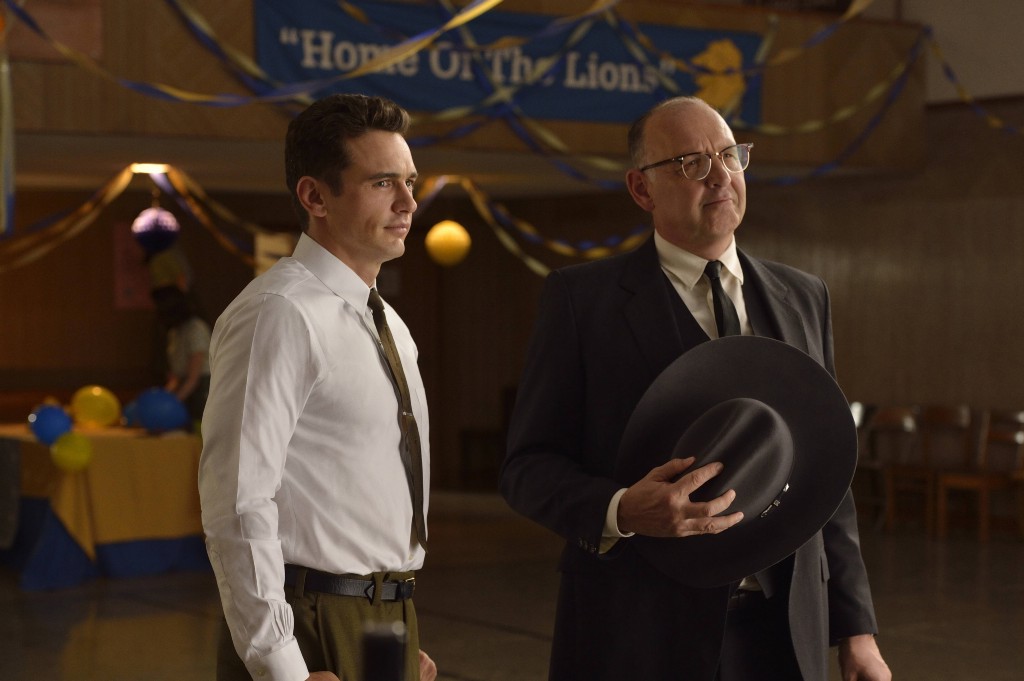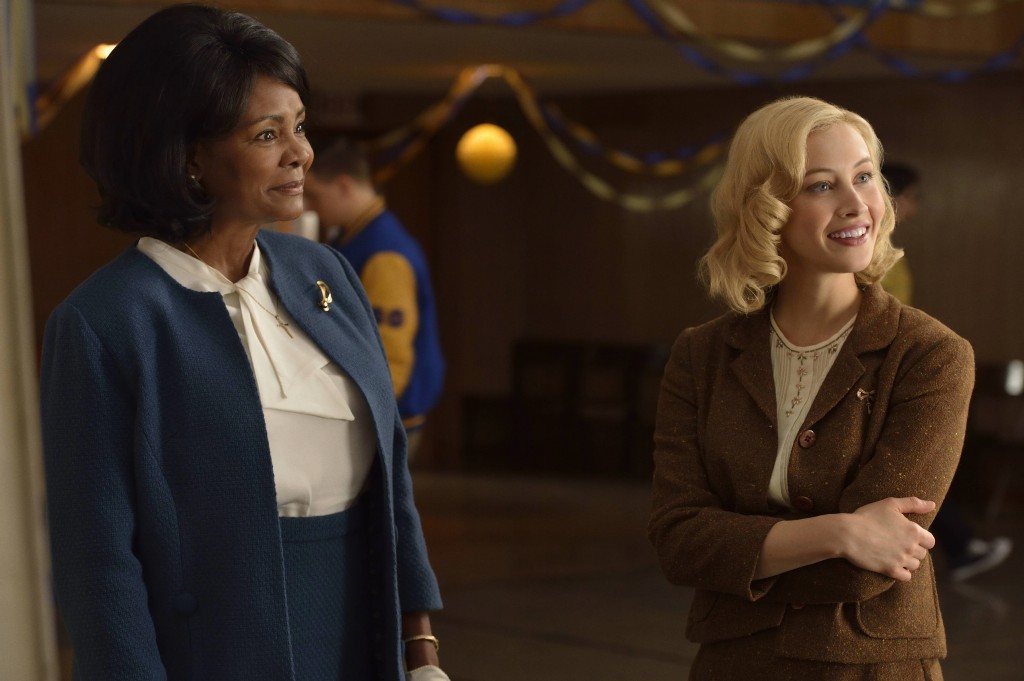Where We're Going, We Don't Need Race
Time-travel narratives and bygone bigotry in “11.22.63” and ‘Back to the Future.’

“Here’s how great it is to be white,” Louis CK says in his 2008 special, “Chewed Up.” “I could get in a time machine and go to any time and it would be fucking awesome when I get there. That is exclusively a white privilege.” Nothing flaunts white privilege quite like a time-travel story. But in those narratives, the subject of historical racism, if it’s handled at all, is often dealt with in a haphazard or obligatory way alongside other lesser concerns. Our protagonist usually has some specified mission of more pressing personal import, but nevertheless, the movies remind us, in self-defeating winks and nods, about how much progress we have made on the race stuff. Remember? We used to use paper maps to get around, but now we have GPS. Remember? We thought smoking was okay, but now we know it causes cancer. Remember? People used to say nigger like it was nothing, and now we know better.
Take Back to the Future.
Fifty minutes into the movie, Marty McFly stumbles into a cafe where he witnesses his own father get humiliated by Biff Tannen. Then, as if from the movie’s unconscious, an animated young black man appears, and by his paper hat and apron, we understand him to be an employee of the cafe, not one of its patrons. This is Goldie Wilson, and in thirty years, he will be mayor of Hill Valley. No one knows this but Marty and us.

“Stand tall, boah,” Goldie chides George McFly. “Have some respeck fa yaself.” The lines demand to be spelled out here in offensive dialect, because Goldie is an offensive caricature in a movie, admittedly, full of caricatures. (Later in the film, when Biff crashes into a manure truck, Goldie runs flying to the scene to do his best Mantan Moreland impression.) “A colored mayor,” says the cafe owner. “That’ll be the day.” Goldie is undaunted. “You wait and see, Mr. Carruthers, I will be mayor.” His head is high, his chest is out, his gold-capped incisor glints: “And I’m gonna clean up this town.” (“Gooood,” says his grumpy white boss, handing him a broom. “You can start by sweeping the floor.”) Maybe in light of his eventual political career, Goldie is beginning to employ the phraseology of the blustery politician. But the line makes no sense.
We have just watched Marty wander, gape-jawed through the dictionary entry for “Pristine 1950s American Town Square” to the sounds of the period appropriate (and thematically resonant) ditty “Mr. Sandman.” Hill Valley has an alien sheen; the classic cars twinkle. You’ve never seen more symmetrical shrubbery. “This has got to be a dream,” says the bewildered time traveler. What in the world is Goldie Wilson talking about? How can you possibly clean up a place as immaculate as Hill Valley? Unless, of course, there’s another side of town: Goldie’s.

I thought of Goldie Wilson’s side of Hill Valley as I made my way through “11.22.63,” which aired this past spring on Hulu. Starring James Franco, the eight-episode series is an adaptation of Stephen King’s doorstop novel of the same title, although periods — or “bullet holes,” as showrunner Bridget Carpenter calls them — have replaced the book’s forward slashes. Franco shines in the role of Jake Epping, an unhappy English teacher/writer from Maine. When a local restaurateur shows him a secret “rabbit hole” in his diner that can transport a person back to the year 1960 (1958 in the book), Jake embarks on a mission to stop the assassination of JFK and thereby save America from the quagmire of Vietnam and other tragedies.

In his quest to re-stitch the fabric of history, Jake makes some highly questionable ethical decisions, falls in love with a beautiful blonde woman, murders a couple of sadistic husbands, and forms an unlikely bond with Miz Mimi, a stern secretary at the high school where he works. Through Jake, we value her intelligence, her heart, her candor. We feel pangs of sadness when we hear that first telltale cough, a heavy-handed harbinger of the cancer that will end her arc. And because her ethnicity is not specified in the novel, we understand that Miz Mimi is white. But in the show, she is portrayed — tenderly, beautifully — by acclaimed stage actress, Tonya Pinkins, who is black.
In a blog entry for Huffington Post, Pinkins reveals that landing the role of Miz Mimi was a conscious attempt by the producers to diversify the cast. But to honestly depict “the experience of a Black woman, in segregated Texas in 1963, encountering a white man from a future 30 years away,” the creators quickly recognized that they had work to do. They had to “create scenes that were not in the novel.” When I asked Carpenter about the casting decision, she said that she “felt strongly that we needed to see Jake interacting with a major supporting character who was black. Description of racism in the background wasn’t going to cut it.”
On the level of character, these new Miz Mimi scenes are the most intrusive changes to King’s novel, and they’re mostly clustered around the third episode of the series, which is titled “Other Voices, Other Rooms,” but which might as well have been called “The One About Ye Olde Racism.” The episode’s primary focus is not Miz Mimi but General Edwin Walker. Walker was a real-life figure, an Army officer turned Confederate-flag-waving segregationist (turned sex offender), who happens to play an integral role in Jake’s larger plan to stop Lee Harvey Oswald.
Early in the episode, when Jake offers to pour Miz Mimi a cup of coffee in the presence of other white teachers and students, they all stop what they’re doing, fall silent, and hold their breath. Poor Jake — good-hearted, from a more progressive future—had forgotten when he was. Later, we hear the coded language of the electrician setting up Jake’s surveillance equipment who mentions the “crisis in America” after proclaiming his love for General Walker. And there is the hate speech offered, apropos of nothing, by Jake’s landlord, perhaps assuming himself in safe company: “I ain’t got a thing in the world against niggers. God who cursed them to their position, not me.”
These encounters take a noticeable toll on Jake, but it isn’t until a yokel gas station attendant refuses to serve a distressed Miz Mimi, telling her to go back to “Niggertown,” that Jake’s anger about all the overt prejudice finally boils over. In this scene—new to the series—Jake snaps, grabbing the attendant by the arm, cursing, chucking wadded up bills. The slight to Miz Mimi offends both his humanity and his chivalry.

On the one hand, the decision to cast Pinkins in the role of Miz Mimi gives us a black character with dimension whom we sympathize with and propels the show far beyond Back to the Future in its handling of bygone bigotry. (During the school-dance sequence near the end of the movie, when one of Biff’s henchmen calls a member of an all-black doo-wop band a “spook,” Marty is conveniently locked in the trunk of a car.) But on the other hand, Jake remains oblivious, in a very familiar way, to the mission-critical importance of his being a straight white guy.
Vile as the hate speech of his prospective landlord may be, Jake still takes the apartment, because of its proximity to Oswald’s—the plot must go on. Jake is honorable enough to stand up for his black friend, but the show is not honest enough to acknowledge the privilege that allows him to score good-guy points by coming to Miz Mimi’s aid as well as to move into any apartment he chooses.
Imagine Jake Epping completing his mission if Chiwetel Ejiofor were cast in the role. The writers would have to hop in a time machine and get King to rewrite his novel from scratch, a new work possibly titled “Three Years a Colored.” Not because casting a black actor would have made it a time-travel narrative about race, but because our history, which time-travel narratives often like to position as separate from us, would demand it.

Whether it’s Marty McFly in 1950s Hill Valley or Jake Epping in segregated Texas, the entire genre of American time-travel fantasy, with its chaos theory nerdery, butterfly-effect affectations, and desire to reshape the present, is irrevocably linked to the very real idea of white privilege. No narrative of time-travel makes this case more powerfully than Octavia Butler’s masterpiece “Kindred,” which both deconstructed and revolutionized the genre by using time travel to explore the experience of slavery and its lingering effects on the present.
Unlike Back to the Future and “11.22.63,” there is no clear mission to speak of in “Kindred,” at least not one that Dana, the black writer at the center of the novel, is aware of. The circumstances for her time travel are ambiguous and entropic and, for a while, aimless. No rabbit holes. No flux capacitors. The time travel just occurs, suddenly, to Dana, and soon, to her white husband. Butler’s point is not that we are better and more self-aware than the backwards people of the past, nor is it that the past only fills rooms with roaches and erases photographs of family members. Rather, it’s that the past can weigh on the present in devastating ways. “Kindred” reminds us that, for some protagonists, traveling back in time is the opposite of escapist fantasy. The past is alive, says “Kindred.” The past is us.
Nostalgia has long been the mother’s milk of white privilege, even if it is, etymologically speaking, a sickness. Jake’s desire to abandon his mission and remain in the past in “11.22.63” is the single most historically relevant aspect of both the show and the novel. We are living in a very nostalgic historical and political moment, one that longs for the fantasy of American greatness, one that believes, like those probably-not-all-dead-just-yet supporters of General Walker, that America is currently undergoing a crisis.
Compare Jake’s reluctance to returning to the present in “11.22.63” with Dana’s relief every time she leaves the past in “Kindred.” A white divorcee, living on a high school teacher’s salary in a post-industrial New England town, Jake arguably lives a more uncertain, complicated socioeconomic life than he would have fifty years ago. He wants to stay in the segregated 1960s, mission be damned. And we feel for him: the root beer’s sweeter, the pie tastes better, and life is easier for a white guy. But his nostalgic longing for that simplicity comes at a price, paid by the anxieties, indignities, racist landlords, and separatist politicians who sought to crush people like Miz Mimi. It is no wonder we never see her side of town.
